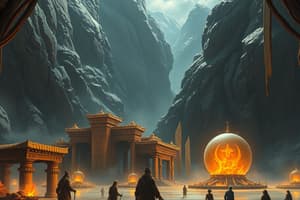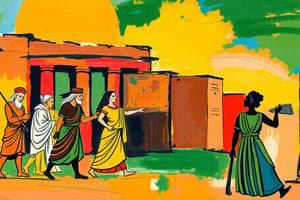Podcast
Questions and Answers
What distinguishes Prehistory from later historical periods?
What distinguishes Prehistory from later historical periods?
- The existence of documented events.
- The absence of agriculture.
- The lack of written records. (correct)
- The presence of advanced civilizations.
Which major civilizations are associated with Ancient History?
Which major civilizations are associated with Ancient History?
- Mesoamerica and the Byzantine Empire.
- Greece and Rome.
- Mesopotamia and Ancient Egypt. (correct)
- Indus Valley and the Viking territories.
What key concept is primarily associated with Classical Antiquity?
What key concept is primarily associated with Classical Antiquity?
- The scientific method.
- Feudalism.
- The rise of nation-states.
- Democracy. (correct)
What significant event is associated with the Middle Ages?
What significant event is associated with the Middle Ages?
Which significant figure is linked to the Renaissance and Reformation?
Which significant figure is linked to the Renaissance and Reformation?
What major shift occurred during the Early Modern Period?
What major shift occurred during the Early Modern Period?
What innovation is NOT typically associated with the Industrial Revolution?
What innovation is NOT typically associated with the Industrial Revolution?
Which of the following was a major global conflict of the 20th Century?
Which of the following was a major global conflict of the 20th Century?
What concept examines how societies evolve, including revolutions, reforms, and cultural shifts?
What concept examines how societies evolve, including revolutions, reforms, and cultural shifts?
Which historical figure is known for leading the Indian independence movement through nonviolent resistance?
Which historical figure is known for leading the Indian independence movement through nonviolent resistance?
What is the importance of historical context in understanding events?
What is the importance of historical context in understanding events?
Which theme in history focuses on the causes, impacts, and resolutions of wars?
Which theme in history focuses on the causes, impacts, and resolutions of wars?
Which of the following figures was a Roman general and statesman whose actions contributed to the rise of the Roman Empire?
Which of the following figures was a Roman general and statesman whose actions contributed to the rise of the Roman Empire?
What aspect of history includes the study of trade, resource distribution, and economic systems?
What aspect of history includes the study of trade, resource distribution, and economic systems?
Flashcards are hidden until you start studying
Study Notes
Key Historical Periods
-
Prehistory
- Time before written records.
- Studied through archaeology and anthropology.
- Key developments: tool-making, agriculture, social structures.
-
Ancient History
- Begins with the invention of writing (~3,200 BCE).
- Major civilizations: Mesopotamia, Ancient Egypt, Indus Valley, China, Mesoamerica.
- Notable events: Construction of pyramids, the rise of empires, development of trade.
-
Classical Antiquity
- Roughly 8th century BCE to 5th century CE.
- Prominent civilizations: Greece and Rome.
- Key concepts: democracy (Greece), republic (Rome), philosophical advancements (Socrates, Plato, Aristotle).
-
Middle Ages
- 5th to late 15th century.
- Characterized by feudalism, the rise of the Christian Church, and the Byzantine Empire.
- Notable events: Crusades, the Black Death, and the beginning of the Renaissance.
-
Renaissance and Reformation
- 14th to 17th century.
- Revival of art and learning based on classical sources.
- Significant figures: Leonardo da Vinci, Michelangelo, Martin Luther (Reformation).
-
Early Modern Period
- 16th to 18th century.
- Rise of nation-states and exploration.
- Events: Scientific Revolution, Enlightenment, and the Atlantic slave trade.
-
Industrial Revolution
- Late 18th to early 19th century.
- Transition to industrialization, urbanization, and technological advancement.
- Key innovations: steam engine, textile manufacturing, and the rise of factories.
-
20th Century
- Major global conflicts: World War I and II.
- Cold War era and decolonization.
- Civil rights movements and technological advancements (Internet, space exploration).
Historical Methodology
-
Sources
- Primary: Original documents, artifacts, eyewitness accounts.
- Secondary: Interpretations and analyses of primary sources.
-
Historiography
- Study of historical writing and perspectives.
- Different schools of thought (e.g., Marxist, feminist, postcolonial).
Important Concepts
-
Causation and Continuity
- Understanding causes of historical events and factors that promote stability over time.
-
Change and Transformation
- Examining how societies evolve, including revolutions, reforms, and cultural shifts.
-
Historical Context
- Importance of situating events within their social, political, and economic frameworks.
Notable Historical Figures
- Alexander the Great: Conqueror who spread Greek culture.
- Julius Caesar: Roman general and statesman whose actions led to the rise of the Roman Empire.
- Cleopatra: Last active ruler of the Ptolemaic Kingdom of Egypt.
- Mahatma Gandhi: Leader of Indian independence movement through nonviolent resistance.
- Nelson Mandela: Anti-apartheid revolutionary and first black president of South Africa.
Themes in History
- War and Conflict: Causes, impacts, and resolutions of wars.
- Economics: Trade, resource distribution, and economic systems.
- Culture and Society: Art, religion, and social structures throughout history.
- Politics and Governance: Development of political systems and ideologies.
Key Historical Periods
- Prehistory involves the era before written records, primarily studied through archaeology, highlighting developments in tool-making, agriculture, and early social structures.
- Ancient History marks the start of writing around 3,200 BCE, featuring major civilizations such as Mesopotamia, Ancient Egypt, the Indus Valley, China, and Mesoamerica, alongside notable events like pyramid construction and the emergence of trade networks.
- Classical Antiquity spans from the 8th century BCE to the 5th century CE, with influential civilizations of Greece and Rome, highlighting the introduction of democracy in Greece and the republic in Rome, as well as philosophical advancements by figures such as Socrates, Plato, and Aristotle.
- Middle Ages extend from the 5th to late 15th century, characterized by feudalism, the influence of the Christian Church, and the prominence of the Byzantine Empire, including major events like the Crusades, the Black Death, and the onset of the Renaissance.
- Renaissance and Reformation occur from the 14th to the 17th century, showcasing a revival of art and learning inspired by classical antiquity, with significant contributions from figures like Leonardo da Vinci, Michelangelo, and Martin Luther.
- Early Modern Period covers the 16th to 18th century, marked by the emergence of nation-states and global exploration, with pivotal events including the Scientific Revolution, Enlightenment thinkers, and the Atlantic slave trade.
- Industrial Revolution, spanning the late 18th to early 19th century, signifies a shift towards industrialization, urban growth, and technological progress, highlighted by innovations like the steam engine, advancements in textile manufacturing, and the development of factories.
- 20th Century is defined by significant global conflicts such as World War I and II, the Cold War, decolonization movements, civil rights initiatives, and rapid technological advancements including the Internet and space exploration.
Historical Methodology
- Sources are categorized into primary sources, which include original documents and artifacts, and secondary sources, which consist of interpretations of primary materials.
- Historiography is the study of the writing of history and its interpretations, reflecting various schools of thought such as Marxist, feminist, and postcolonial perspectives.
Important Concepts
- Causation and Continuity examines the reasons behind historical events and the factors that ensure stability within societies over time.
- Change and Transformation focuses on societal evolution through revolutions, reforms, and cultural shifts, analyzing how these changes shape history.
- Historical Context emphasizes the necessity of understanding events within their respective social, political, and economic frameworks.
Notable Historical Figures
- Alexander the Great is recognized for his conquests that facilitated the spread of Greek culture across large regions.
- Julius Caesar played a crucial role as a Roman general and statesman, whose actions paved the way for the rise of the Roman Empire.
- Cleopatra was the last active ruler of the Ptolemaic Kingdom of Egypt, known for her political acumen and relationships with powerful Roman leaders.
- Mahatma Gandhi is renowned for leading India’s independence movement, advocating for nonviolent resistance against British rule.
- Nelson Mandela is celebrated as an anti-apartheid revolutionary who became South Africa's first black president, symbolizing the struggle for racial equality.
Themes in History
- War and Conflict explores the underlying causes, consequences, and resolutions associated with warfare throughout history.
- Economics investigates trade dynamics, resource allocation, and the evolution of economic systems over time.
- Culture and Society reflects on the impact of art, religion, and social structures, showcasing the diverse experiences of people throughout history.
- Politics and Governance focuses on the progression and development of political systems and ideologies, analyzing their influence on societies.
Studying That Suits You
Use AI to generate personalized quizzes and flashcards to suit your learning preferences.



